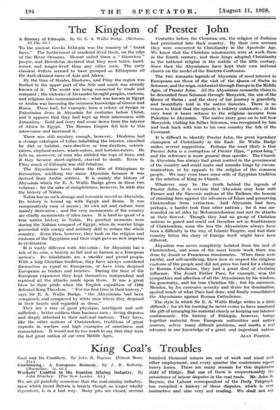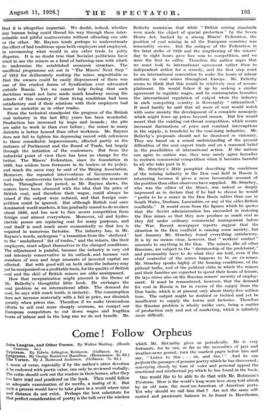King Coal's Troubles
Coalmining : A European Remedy. By J. R. Bellerby. (Macmillan. 38. 6d.) Workers' Control in the Russian Mining Industry. By John Strachey. (The New Leader. 6d.) WE are all painfully conscious that the coal-mining industry, upon which Great Britain is largely though no longer wholly dependent, is in a bad way. Many pits are closed, several hundred thousand miners are out of work and must seek other employment, and every quarter the coalowners report heavy losses. There are many reasons for this deplorable state of things. But one of them is unquestionably the persistence of labour disputes in the coal trade. Mr. John R. Raynes, the Labour correspondent of the Daily Telegraph, has compiled a history of these disputes, which is very instructive and also very sad reading. We shall not say.
that it is altogether impartial. We doubt, indeed, whether any human being could thread his way 'through these inter- minable and pitiful controversies without offending one side or the other. Mr. Baynes tends perhaps to underestimate the effect of bad traditions upon both employers and employed, in envenoming what would in any other trade be petty disputes. It is no doubt true that Socialist politicians have tried to use the miners as a kind of battering-ram with which to undermine the established economic structure. The unofficial programme set out in " The Miners' Next Step " of 1912 for deliberately making the mines unprofitable so that the owners could be easily dispossessed of them was one of the crudest forms of Syndicalism ever advocated outside Russia. Yet we cannot help feeling that such doctrines would not have made much headway among the miners of this country if their living conditions had been satisfactory and if their relations with their employers had been as amicable as in other trades.
From the technical standpoint the progress of the British coal industry in the last fifty years has been wonderful. Production has increased by leaps and bounds ; the pits are safer to work in than ever before ; the miner in many districts is better housed than other workmen. Mr. Raynes does not fail to lighten his depressing record with references to these remarkable improvements, effected partly at the instance of Parliament and the Board of Trade, but largely through the initiation of the coalowners. But from the industrial point of view there has been no change for the better. The Miners' Federation, since its foundation in 1888, has seldom been fortunate in its leaders or its policy, and much the same may be said of the Mining Association. Moreover, the repeated interventions of Governments in coal trade controversies have tended to obscure the economic facts. Throughout the period, as Mr. Raynes shows, the miners have been obsessed with the idea that the price of British coal, and therefore their wages, could always be raised if the output were reduced, and that foreign com- petition could be ignored. But although British coal once dominated world markets, it has gradually ceased to do so since about 1895, and has now to face severe competition from foreign coal almost everywhere. Moreover, oil and hydro- electric power are replacing coal for many purposes, and coal itself is used much more economically so that less is required in numerous factories. The industry has, in Mr. Raynes's words, undergone " a transition from the ' sheltered ' to the ' unsheltered' list of trades," and the miners, like their employers, must adjust themselves to the changed conditions. The adjustment is painful, because the industry is very old and intensely conservative in its outlook, and because vast numbers of men and large amounts of invested capital are affected. But with good will on both sides the industry may yet be reorganized on a profitable basis, for the quality of British coal and the skill of British miners are alike unsurpassed.
How that reorganization might proceed is the theme of Mr. Bellerby's thoughtful little book. He envisages the coal problem as an international affair. The demand for coal, he says with much truth, is inelastic. The consumption does not increase materially with a fall in price, nor diminish greatly when prices rise. Therefore if we make tremendous efforts to sell coal more Cheaply overseas, we compel our European competitors to cut down wages and lengthen hours of labour and in the long run we do not benefit. Mr. Bellerby maintains that while " British mining standards were made the object of special protection " by the Seven Hours Act, backed by a strong Miners' Federation, the position of coal mining in all the European countries was reasonably secure. But the collapse of the Federation in the fatal strike of 1926 and the lengthening of the miliers' day to eight hours gave free rein to competition, and we were the first to suffer. Therefore the author urges that we must look to international agreement rather than to independent action for a remedy, and the first step must be an international convention to make the hours of labour uniform in coal mines throughout Europe. Mr. Bellerby seems to think that this would be relatively easy of accom- plishment. He would follow it up by seeking a similar agreement to regulate wages, and he contemplates hereafter the international regulation of output when the industry in each competing country is thoroughly " rationalized." It need hardly be said that all users of coal would watch with some anxiety the development of a complete monopoly which might force up prices beyond reason. But few would assert that the existing cut-throat competition, which means incessant fluctuations of price and constant interruptions in the supply, is beneficial to the coal-using industries. Mr. Bellerby's proposals should not be dismissed as visionary. They are based on a sound understanding of the present difficulties of the coal export trade and on a reasoned belief in the possibilities of international action. If the nations can agree to outlaw war, they may surely agree hereafter to restrain commercial competition when it becomes harmful to all who take part in it.
Mr. Strachey's little pamphlet describing the conditions of the mining industry in the Don coal field in Russia is interesting because it gives a more favourable account of the position than other observers have supplied. Mr. Strachey, who was the editor of the Miner, was indeed so deeply impressed as to declare that if he had to choose he would " prefer to be a miner in the Don Basin rather than one in South Wales, Durham, Lancashire, or any of the older British coalfields." It would seem from the figures which he quotes that the Soviet administration has succeeded in restoring the Don mines so that they now produce as much coal as they did under ordinary commercial management before the War. Recent newspaper reports suggest that the situation in the Don coalfield is causing some anxiety, but last January Mr. Strachey found everything satisfactory. It is by no means clear, however, that " workers' control " amounts to anything in the Don. The miners, like all other Russians, are subject to the " dictatorship of the proletariat," and presumably have to do what they are told, even if the chief controller of the mines happens to be an ex-miner. Mr. Strachey speaks highly of the housing conditions, of the pithead baths, and of the political clubs in which the miners and their families are expected to spend their hours of leisure. He lays stress also on the Russian miners' security of employ- ment. It must be remembered, however, that the demand for coal in Russia is far in excess of the supply from the Don basin, which is at present only about thirty-five million tons. The output might be doubled or trebled and yet be insufficient to supply the towns and factories. Therefore the Russian problem is wholly unlike ours, being a matter of production only and not of marketing, which is infinitely more difficult.





























 Previous page
Previous page